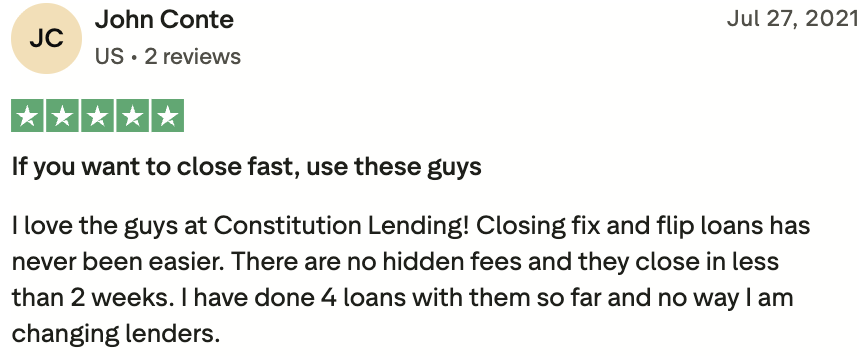Historically, DSCR loans were exclusively used to purchase ready-to-rent investment properties.
So, if borrowers wanted to construct rental properties and lease them to tenants, they had to apply for a construction loan and then refinance it with a DSCR loan at the end of the term.
This creates a requalification risk, as there’s no guarantee the DSCR lender will approve the refinance or provide the rates you wanted at the beginning of construction. This problem is exacerbated if you’re sourcing your loans from different lenders.
If refinancing falls through, you’re left without an exit, forcing you to either sell before the loan term is over or settle for an expensive loan.
To address this issue, Constitution Lending offers loan programs that combine short-term construction loans with long-term DSCR loans.
When you apply for a new construction loan, we’re transparent about the DSCR rates you’ll qualify for after the term, based on neighborhood rents, real estate market trends, and our experience as a private lender.
Once your project is complete, we can automatically convert your construction loan to a DSCR loan — significantly reducing the risk of last-minute refinancing headaches.
In this article, we explain the eligibility requirements borrowers must meet to secure DSCR construction loans and how they can start applying, including gathering the necessary paperwork. At the end, we review what sets Constitution Lending apart from other private lenders.
Use our automated pricer to map out different loan scenarios and access instant quotes. We can close loans in as little as four days.
Eligibility Requirements for DSCR Construction Loans
- A down payment worth 15% to 45% the total construction cost
- A projected DSCR of 0.75 to 1.00 and above
- A minimum credit score of 660
Down Payment of 15% to 45% the Total Construction Cost
Lenders want borrowers to have an equity stake in the construction project, so they are incentivized to manage it responsibly and stay committed through challenges. If a lender were to finance the entire ground-up construction, the borrower would face no exposure to construction risk.
As a result, lenders typically require a down payment of around 15% to 45% of the total construction cost.
A Projected DSCR of 0.75 to 1.00 or More
DSCR is a ratio that divides a property’s rental income by its mortgage loan payments, taxes, and insurance, among other operating expenses, and it’s a key factor behind your eligibility.
If a single-family property is expected to rent for $2,500 once construction is complete and its debt obligations are $1,500, the property’s DSCR would be 1.66. ($2,500 ÷ $1,500 = 1.66.)
Most lenders have a minimum DSCR requirement of 1.0, but Constitution Lending can fund deals with a DSCR as low as 0.75.
However, the main distinction between a DSCR construction loan and a regular DSCR loan is that the property isn’t ready to rent and there are no existing leases. Instead, DSCR lenders will use the rents of similar properties in the area to estimate DSCR.
A Minimum Credit Score of 660
Credit score plays an important role in whether you qualify for a DSCR construction loan, as well as your interest rates, loan options, and total loan amount.
That’s because a credit score is a reliable indicator of a borrower’s financial responsibility and willingness to repay debt. The higher a borrower’s credit score, the more it demonstrates a consistent history of repayment — and the more confidence a lender will have in working with them.
At Constitution Lending, we’ve funded borrowers with credit scores as low as 660; however, we highly recommend improving your credit score as much as reasonably possible before applying, because that will allow you to qualify for lower interest rates and larger loan amounts.
How to Apply for a DSCR Construction Loan & Paperwork Requirements
The application process and paperwork you’ll need to submit for a DSCR construction loan depend on the lender you’re applying with.
At Constitution Lending, we’ve designed our loan application process and paperwork requirements to be simple and stress-free for borrowers.
Here’s what paperwork you’ll need to gather and submit:
- A scope of work and construction budget: You’ll need a licensed contractor to draw up a scope of work, which details what you plan to build, and a construction budget estimating how much it’ll cost.
- An appraisal report: A licensed appraiser needs to evaluate the construction budget and scope of work, comparing them to similar sales and construction projects in the area to estimate the future property value.
- Proof of liquidity: These are usually three months of bank statements that show you have the required down payment in a bank account.
- Proof of insurance: You’ll need insurance starting on the day of closing.
- Personal documents: This includes a driver’s license or government-issued ID and entity documents.
Here’s what the entire application process looks like:
- Enter some details into our DSCR loan pricer, such as where you want to construct the property, the type of property you want to construct, your credit score, and the number of deals you’ve completed in the past 12 months.
- From here, our pricer will send you to a dashboard where you can experiment with various construction budgets, desired LTVs (loan-to-value), LTC (loan-to-cost), after-construction values, and net operating incomes (NOI). On the right, the pricer generates three quotes, each detailing the interest rate, term, and buydowns you qualify for.

- Choose a quote, enter your name and email address, and we’ll issue you an instant pre-approval letter, term sheet, and documents portal link where you can submit all the paperwork we mentioned above.

- We start underwriting your documents, give you a definitive yes or no, and close within 7 to 14 days.
- At the end of the construction loan’s term, which is typically 12 months, you rent out the property, and we convert it into a long-term, 30-year DSCR loan at a lower interest rate.
Read more: DSCR Loan Pros and Cons: A Detailed Guide for Investors
Why Choose Constitution Lending for DSCR Construction Financing
In addition to getting both loans from a single lender, Constitution Lending’s financing solutions offer the following advantages:
- We close faster than most DSCR and hard money lenders.
- We're a direct lender, so we can guarantee a stress-free closing.
We Close Faster Than Most DSCR and Hard Money Lenders
A problem we see borrowers frequently complain about is lenders taking too long to fund loans.
This is especially common with construction financing, which is typically funded in stages, also known as draws, with the lender inspecting the property and reviewing invoices before each draw is approved.
Lenders who take too long to inspect the property can cause construction slowdowns and increased costs as contractors pause work and equipment rentals remain idle.
Constitution Lending speeds up the application, closing, and funding process using tools like our automated pricer and documents portal.
Instead of having to book a phone call with a loan officer or walk into a branch to get a quote, you can simply enter some details into our automated pricer and instantly receive quotes, term sheets, and pre-approval letters.
At the same time, you can submit all the paperwork we mentioned above through our documents portal, and we begin underwriting. This initial application process takes less than 10 minutes and enables us to close in 7 to 14 days, sometimes as quickly as 4 days.
Once you’ve completed a construction stage, you can notify us in the borrower portal, and we’ll inspect the property on the same day or the next day, minimizing delays.
Read more: 6 Best Rental Property Lenders & How to Pick the Right One
We’re a Direct Lender, Not a Broker, So We Can Guarantee a Smooth Closing
Another issue we frequently hear from borrowers is that they’ll receive a rejection letter right before they are about to close. This applies to both the initial construction loan and the DSCR refinancing.
The reason for last-minute rejections being so common is loan brokers. Here’s why:
- Loan brokers aren’t the ones lending you the funds. They connect you to an end lender. This means that they aren’t the ones who decide whether you qualify. The end lender is the decision maker.
- The loan broker may believe you can qualify, but can’t be 100% sure until the actual lender underwrites your paperwork and gives the green light.
- If the lender sees issues with your application during the latter stages of underwriting that the broker overlooked, it can lead to last-minute complications, and even rejections — sometimes on the day of closing.
When you apply with Constitution Lending, you’re working with a direct lender. We fund your construction and DSCR loan without relying on outside lenders.
The advantage is that you receive clear, upfront communication about your eligibility. We're the decision-makers; we know our requirements and can determine whether you qualify within hours of reviewing your documents. We won’t come to you at the last minute with a rejection letter.
Here’s what clients say about our DSCR construction loan products:



Construct and Lease Real Estate Investment Properties at Low Interest Rates with Constitution Lending
Get instant DSCR loan quotes through our pricing tool and see the rates and terms you qualify for.
Frequently Asked Questions
Can you use a DSCR loan for construction?
While DSCR loans typically aren’t used for construction, lenders such as Constitution Lending offer construction loans that can be automatically converted into long-term DSCR loans. That way, you receive your construction and DSCR loans from the same lender, reducing requalification risk and paperwork.
What is an optimal debt service coverage ratio?
A good DSCR for a rental property is above 1.0, as it means the property’s rental income can cover its debt obligations and potentially cover emergency repairs and periods of vacancy. However, with rising interest rates, it has become more difficult to achieve a 1.0 DSCR metric on a rental property, so lenders like Constitution Lending have lowered the minimum DSCR to 0.75.
What are the benefits of using a DSCR loan for multifamily investing?
DSCR loans are a popular long-term financing option among real estate investors purchasing multifamily homes because they’re approved based on the property’s cash flow and not your personal income. This allows investors with non-W-2 income, tax write-offs, high DTI ratios, and unorthodox finances to qualify.
How do DSCR construction loans differ from traditional construction loans?
DSCR construction loans are loan products that allow you to construct long-term rental properties. Then, when the term is over, you can convert them into a longer-term DSCR loan, so you can lease the property out and use the cash flow to make loan payments. Traditional construction loans aren’t converted into DSCR loans, so borrowers must sell the property before the term is over.
How does a DSCR construction loan work?
Construction loans work by first issuing borrowers a short-term hard money loan. Then, when the construction is complete, the hard money loan is converted into a DSCR loan with 30-year terms and lower interest rates, allowing the borrower to rent the property. The benefit of refinancing with a DSCR loan instead of a traditional mortgage loan is that qualification is based on the property’s income and debt payments, and not your personal finances.







